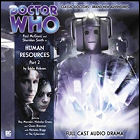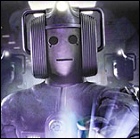 With the Doctor and Lucie embroiled in a conflict with warmongers on one side and the inhuman Cybermen on the other, the Doctor isn’t sure who he should back. But even as he noodles his way through that question, many more are raised. Who is responsible for this war being fought? Why is it being run in such a peculiar fashion? And what was so important about Lucie that so many people were making so much fuss about her? The answers lead all the way back to the Doctor’s home planet of Gallifrey and, as usual, he’s not going to like them…
With the Doctor and Lucie embroiled in a conflict with warmongers on one side and the inhuman Cybermen on the other, the Doctor isn’t sure who he should back. But even as he noodles his way through that question, many more are raised. Who is responsible for this war being fought? Why is it being run in such a peculiar fashion? And what was so important about Lucie that so many people were making so much fuss about her? The answers lead all the way back to the Doctor’s home planet of Gallifrey and, as usual, he’s not going to like them…
written by Eddie Robson
directed by Nicholas Briggs
music by ERSCast: Paul McGann (The Doctor), Sheridan Smith (Lucie Miller), Katarina Olsson (Headhunter), Roy Marsden (Hulbert), Nickolas Grace (Straxus), Owen Brenman (Jerry), Louise Fullerton (Karen), Andrew Wisher (Malcolm), Nicholas Briggs (Cybermen)
Timeline: after Human Resources Part 1 and before Dead London
LogBook entry & review by Philip R. Frey
Review: The second part of Human Resources serves as the conclusion to the current story, as well as the entire series as a whole. As such, all the questions that have been raised so far (why the Headhunter was after Lucie, why she was sent with the Doctor by the Time Lords) are answered. I was actually a bit surprised that they wrapped things up so tightly, but I guess they didn’t want any loose ends in case there isn’t a second series.
In any case, it does both those jobs admirably. The two-parter proves to be one of the strongest stories in the series and as a series-ender, the answers prove to be mostly satisfactory. In fact,  the only way I would say that Human Resources truly fails is as a Cyberman story. I’m quite partial to the Cybermen and while they are effectively portrayed here, they are, to my mind, almost entirely extraneous. While they are revealed to be the primary threat, the Doctor deals with them directly very little. And that’s always been the strongest part of Cybermen stories; when the Doctor squares off against their logical minds with his quite different one. It really didn’t need to be the Cybermen here. It could have been just about any universe-dominating species. But the Cybermen it is and they are carried off well, so no major complaints from me.
the only way I would say that Human Resources truly fails is as a Cyberman story. I’m quite partial to the Cybermen and while they are effectively portrayed here, they are, to my mind, almost entirely extraneous. While they are revealed to be the primary threat, the Doctor deals with them directly very little. And that’s always been the strongest part of Cybermen stories; when the Doctor squares off against their logical minds with his quite different one. It really didn’t need to be the Cybermen here. It could have been just about any universe-dominating species. But the Cybermen it is and they are carried off well, so no major complaints from me.
Without the need for establishing scenes, the dialogue is much stronger throughout than it was in some parts of the first installment. The only place where the problems that plagued the beginning of part one resurface is when the Headhunter brings things to a screeching halt for some plot exposition. But, other than that and some unnecessary character commentary also from the Headhunter, most of the cast comes off well. The Doctor gets to play some of his well-known righteous indignation (at the Corporate head, at the Cybermen, at that poor, lone Time Lord), as well as engage in proper Doctor banter throughout. Lucie continues to prove herself to be more than just a Rose clone, by again showing more spine and never falling into self-pity and whimpering, no matter how bad things get. (When a major revelation about Lucie is apparently revealed, it makes sense because she’s been shown to be so strong.) Only the Headhunter comes off poorly in the end, never really being able to justify the build-up she received all series long. Frankly, she could have been introduced in the previous story with no serious harm to the character.
The portrayal of the Time Lords (through the single member shown here) is somewhat improved, though it still seems odd that the Doctor only meets one. This time, we get to see all their sides. He is alternatively honest, politic, treacherous and just. Perhaps they meant for there to be more than one and had to adjust things, but I can’t help but think that a small, conflicted council of Time Lords would have been dramatically more successful. Still, it works.
As a conclusion to the whole series and a pointer to the continued travels of the Doctor and Lucie, Human Resources also successfuly establishes the basis for a long-term relationship between the two. And it’s a really different relationship as far as I can tell. I can’t remember a companion that had such a high opinion of him or herself as Lucie does. Her bickering with the Doctor is playful and has an edge to it, showing that she isn’t in the least bit cowed by the Doctor, nor is she in awe of him as so many companions of the past. (In particuler, she flies in the face of the new TV series’ attitude that the companions’ lives are empty without the Doctor. One gets the sense that when Lucie moves on, she won’t be crying in her soup about it twenty years later.) The Doctor and Lucie prove a more successful team than most original-to-audio pairings and she’s the first non-televised companion that I’ve felt could give any of the TV ones a run for their money. (I mean, she’s got it all over Dodo for a start.) I never really minded Charley, but Lucie’s just got more about her.
All in all, the 2007 series does a perfect job of straddling the line between the old series and the new. This is appropriate, since it stars the Eighth Doctor, considered the last of the classic line, but the Doctor whose sole televised adventure pointed in the direction the series proper would eventually go. Structurally, it follows the new series, with its linked, but stand-alone stories. But its attitude (mostly positive and life-affirming) is much more like the original run. For some reason, I’ve always found the Eighth Doctor Big Finish stories much more palatable than those from the other Doctors. Maybe its because he doesn’t have as many stories for the producers to contradict. In any case, the trend continues here, as I found this series on the whole to be very entertaining and it left me hoping for more. I was one of those who hoped McGann would be allowed to pick up the role when the 2005 series was being developed, as I liked him enough to want to see more of his Doctor. So until Russell T. Davies changes his mind about multi-Doc stories and gives us a great Seventh-Eighth-Ninth-Tenth crossover, this series has at least helped satiate my want of more stories for the time being.
